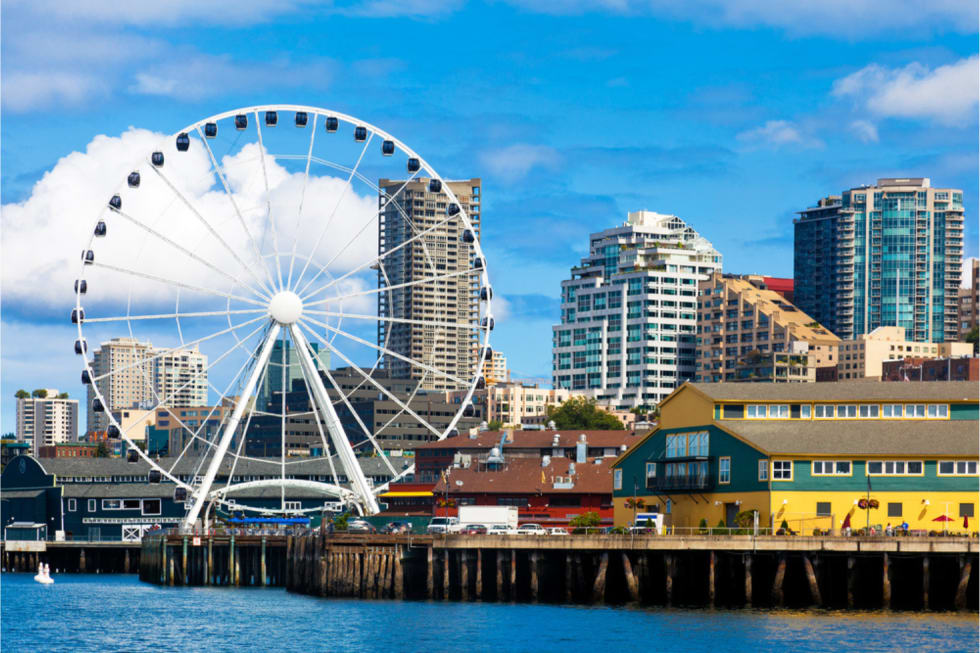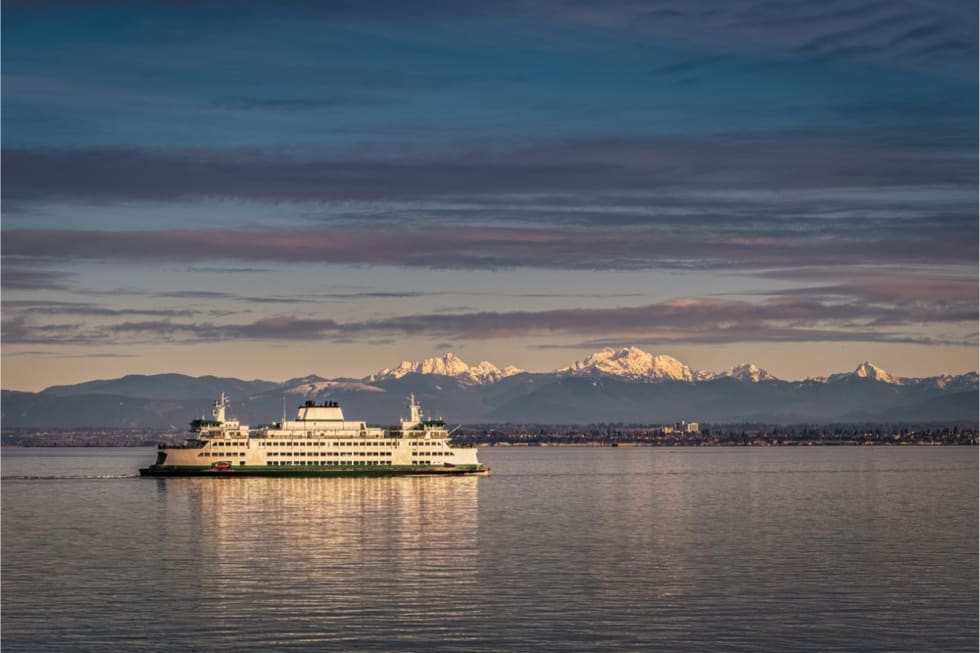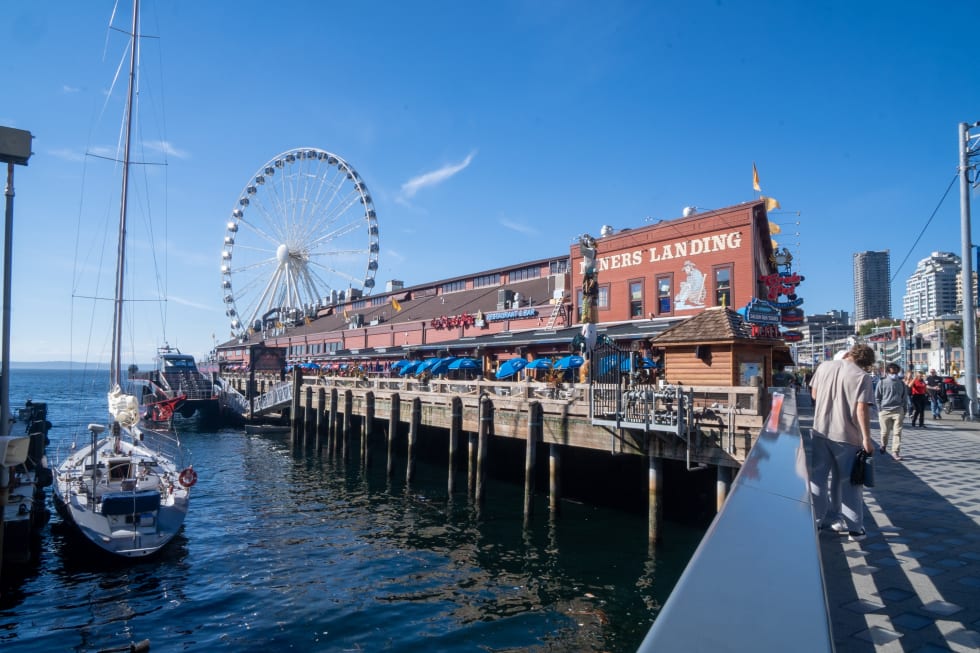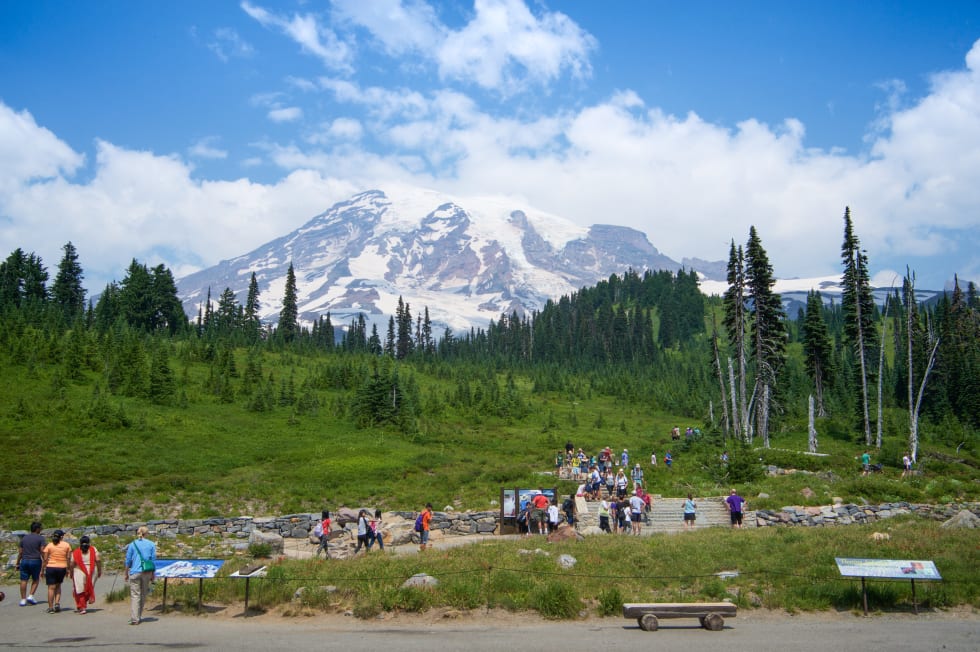- 120 units available
- Studio • 1 bed • 2 bed
- Amenities
In unit laundry, Patio / balcony, Hardwood floors, Dishwasher, Pet friendly, New construction + more

With mountains, volcanoes, beaches, and deserts, Washington state offers enough variety to draw in new residents from across the world. Not only do locals enjoy gorgeous views and outdoor recreation opportunities, but Washington residents also benefit from the state’s plethora of apple orchards, proximity to the ocean, and lots more, making the Evergreen State a special place to call home.
If you’re looking to move to Washington, you’ll need to create an accurate budget to ensure that your move is headache-free.
We’ve got you covered! Here’s everything you need to know about the cost of living in Washington state.
The cost of living in Washington is 20.17% higher than the national average, making it the sixth most expensive state in the country. That cost is even higher in some areas like Seattle.

The most expensive city in Washington is San Juan County, where the cost of living is 48.62% higher compared to the state average and 78.6% higher than in the rest of the U.S.
The cheapest major city in Washington is Richland-Kennewick-Pasco, with a cost of living 18.45% lower compared to the state average and 2% lower than the national average.
As of June 2024, average rent in Washington for bedrooms of any size is $1,755 a month. For one-bedroom apartments, that average is $1,538, while two-bedrooms go for closer to $1,724. Here are median rent rates in two of Washington's biggest cities:
| Location | One-Bedroom Rent | Two-Bedroom | Overall Median Rent |
|---|---|---|---|
| Seattle | $1,890 | $2,359 | $2,026 |
| Spokane | $913 | $1,213 | $1,147 |
| Tacoma | $1,375 | $1,718 | $1,610 |
| Vancouver | $1,418 | $1,645 | $1,659 |
If you're not looking to rent, you should know that the median home value in Washington is $473,400, with homeowners spending around $2,249 per month on associated costs including mortgage. Housing should always be the first cost you consider when moving to a new state. Not only do rent prices vary drastically by location, but they can also change drastically over time.
If you want a deeper dive into certain areas, learn about the best places to live in Washington!
Your recommended salary is the pre-tax salary you should earn to live comfortably in a specific location. To determine your recommended salary, you’ll need to use the 30% rule. To live comfortably, your pre-tax income should be at least three times the price of rent. At an overall average of $1,755, you would need to earn a little less than $75,000 a year to comfortably afford an apartment. That's quite a bit more than the $53,242 salary MIT estimates you need to make a living wage in the state.
The average American renting a 915 square foot apartment pays $253.14 monthly for basic utilities. In Washington, that average is slightly lower at $241,05. Let's see how that breaks down by city and type of utility:
| Location | Avg Electric | Avg Gas | Avg Water | Avg Fuel | Total |
|---|---|---|---|---|---|
| Washington | 134.46 | 35.13 | 67.38 | 4.07 | 241.05 |
| U.S. | 150.93 | 51.12 | 45.52 | 5.57 | 253.14 |
| Seattle, WA | 154.63 | 28.38 | 38.41 | 1.13 | 222.54 |
| Spokane, WA | 108.01 | 71.26 | 39.74 | 2.70 | 221.71 |
Electricity, water, and gas are the services that make up basic utilities. A landlord might cover basic utilities, but the renters usually cover them. That said, it’s important to estimate your utilities when building your apartment budget. We call it an estimate because many factors influence utility costs, including personal preference, your apartment’s size, the age of your appliances, and more.
Regardless, having a general idea of basic utility costs can help you build an accurate budget.

In addition to basic utilities, many renters pay for phone and internet service. You will likely need to consider these costs in your budget. The national average cell phone bill is $114 a month, while the average internet bill is around $60.
However, you’re at an advantage if you are moving from out of state. If you switch internet or phone providers, you may be eligible for new customer discounts and promotions that can help you save big on your service.
Washington's public transportation is difficult to assess on a state level because the state follows the traditional pattern of public transportation offerings. Most people in the suburban areas rely on personal vehicles for transportation, while those who live in the heart of the metropolitan area have greater access to public transportation options.
That said, Seattle, Washington's largest city, has a comprehensive public transportation system operated by multiple agencies. As a result, the city has some of the highest rates of commuters in the nation who rely on public transportation. Riders can get around via train, bus, or water taxi!
If you choose to rely on public transportation, you might save a pretty penny. MIT's Living Wage Calculator sets the average Washington resident's annual transportation cost at $4,938. For a family of four with two children, this expense increases to $13,456 annually.
As a monthly public transportation pass costs a low $99.50 per month or $1,194 per year, you can expect over 75% in savings.

Everyone loves good eats — Washingtonians included. So if you plan to take up residence in Washington, you won't be immune to the local cuisine and premier restaurants that line the state.
Whether you plan to treat yourself once a month or more frequently, you'll need to know how much those delectable meals will affect your budget. Here's what you can expect to pay for a three-course meal for two in Washington, according to Numbeo.
Don’t forget to add the standard gratuity of 15% to your bill!
Unless your monthly food budget is formidable, you’ll need to spend some time in the kitchen making some delicious homemade meals.
If you’re someone with incredible will and discipline, you might be able to make all of your food at home. If so, you can expect to pay $3,999 annually or $333.25 monthly for your groceries. However, if you shop for a family of four, expect to pay $11,764 annually or $980.33 monthly.
If you want to reduce this expense, try a discount grocer. Many Washington residents swear by Sprouts for low-cost groceries and great deals on produce.
The average Washington resident spends $2,539 on medical costs each year. Families of four spend a whopping $7,558 annually. However, these numbers only account for employer-provided health insurance. If your employer does not provide health insurance, you may have substantially different costs.
If you are in the market for health insurance, you can head to Healthcare.gov for low-cost, affordable health insurance coverage. Just be sure to report your move to ensure that you don’t experience a lapse in coverage.
Head over to the Washington State Department of Health for valuable state health resources. Whether you require specialized care or are looking for specific services, the site will help you find what you need.
Although Washington isn’t known for its fitness and entertainment options, it offers many opportunities for anyone seeking to work up a sweat or have some fun.
However, these opportunities will undoubtedly have an impact on your budget.
The average Washington resident spends $2,581 on fitness and entertainment costs annually, while a family of four spends $5,120 annually. Here are some of the things they spend it on!
In love with the thrill of visiting the gym and working up a sweat? Here’s what you can expect to pay for a fitness club membership in Washington’s biggest cities.
If you prefer more economical fitness options, don’t worry! There are tons of free and low-cost fitness options in Washington. Many folks choose to run or bike. Better yet, walking is a low-cost way to keep fit and explore the city.

Whether you’re an avid hiker or looking for a fun way to spend a weekend, Washington offers residents close proximity to several incredible national and state parks.
These are low-cost and free entertainment options that are awesome for families or fun solo excursions.
Hiking, biking, fishing, paddling, running, walking, and more await you at a Washington national park. Here’s how much entrance to these parks costs.
If you love the arts or love the science of curation, head to one of Washington’s many museums. These relatively inexpensive options, offer tons of entertainment and learning opportunities. Here is the cost of general admission for some of Washington’s most popular museums.
Keep in mind that you may need to pay more if you want to check out some of the newer exhibits or special attractions. However, museums usually offer a discount on certain days. If you plan it right, you might be able to save big.

The good news is that Washington is home to professional football, basketball, hockey, and baseball teams. The bad news is that you’re in for a drive unless you live in Seattle. You can tack on gas prices in addition to the cost of your ticket. Here’s a breakdown of the average ticket costs for each professional sports team:
If you want to save a bit and avoid the drive, head to your local sports bar to meet fellow fans, eat good food, and have great drinks while watching the game.
Moving to a new state can be challenging to budget for, as many costs are difficult to assess.
If The Evergreen State is calling your name and your budget is signaling green for the move — it’s time to start your search for the perfect Washington apartment! If affordability is a concern, check out the cheapest places to live in Washington.
Take our quiz to get registered and start browsing Washington apartment listings!
As of November 2024, the average rate of rent in Washington is $1,755 per month for apartments of all sizes.
Some of the cheapest rents in Washington are found in Spokane. A one-bedroom apartment in Spokane costs $913 and a two-bedroom apartment costs $1,213.
We estimate that you need around $75,000 a year to comfortably afford an apartment in Washington and have enough left over for savings and entertainment. MIT says that the living wage - the bare minimum you need for survival - is $53,242 before taxes.
Washington is 954.6 miles from California and takes over 16 hours to drive via US-97 N. You can also fly or drive between the two states. A flight from Seattle to Los Angeles, California takes about 4 hours.
Washington to Oregon is 359.2 miles via US-97 N and takes about 6 hours and 30 minutes to drive. Buses and flights are also available between the two states. The flight from Seattle to Portland takes about an hour.
Yes, Washington is cheaper than living in California. The average rent for a California one-bedroom apartment is $2,054.79. In Seattle, a one-bedroom costs $1,589, which is among the most expensive places to live in Washington.
No, Washington is not cheaper than living in Oregon. Spokane is among the cheapest places to live in Washington. A one-bedroom apartment costs $941. In Oregon, one of the cheapest places to live is Eugene. Eugene has an average rent of $1,610 for a one-bedroom apartment.
According to the U.S. Census Bureau, the population of Washington was 7,738,692 in 2020.
The Census Bureau reports that the average salary for Washington residents is $75,550. In Seattle, you'll need an average income of $63,600 to afford a one-bedroom apartment. In Tacoma, you will need a salary of $47,920 to live comfortably. If you live in Spokane, you need at least $37,640 for a one-bedroom apartment. Living in Vancouver requires $54,440 for a comfortable lifestyle in a one-bedroom apartment.



In unit laundry, Patio / balcony, Hardwood floors, Dishwasher, Pet friendly, New construction + more
In unit laundry, Patio / balcony, Granite counters, Hardwood floors, Dishwasher, Dogs allowed + more